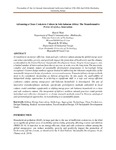| dc.description.abstract | A transition to an energy‑efficient, clean and safe cookstove culture among the global energy‑poor
can reduce mortality, poverty and positively impact the protection of biodiversity and the climate,
as identified in the United Nations’ Sustainable Development Goals. Despite broad support, only
a limited number of interventions have shown success, at scale, over the long term. The uncertain,
complex and dynamic nature of sustainable development programmes is increasingly being
recognised. Current design methods appear limited in addressing the inherent complexities of the
sustainable integrated design of products, services and systems. Transdisciplinary design methods
need to be considered, inculcating an African perspective. In this paper, the applicability of
indigenised design approaches in achieving a significant shift to a safe and energy-efficient
cookstove culture among energy-poor sub‑Saharan households is investigated. The use of
innovative transdisciplinary methods, specifically participatory methods embedded in local
culture, could contribute significantly to shifting energy-poor sub‑Saharan households to a clean
and safe cookstove culture. The integration of Africa’s resilient cultural practices could provide
individual and collective alternatives to design research methods rooted in Western ontological
and epistemological approaches, in transitioning to a sustainable future.
Keywords:Afrikan Design Innovation, Afrikology, Appropriate Technology, Clean Cookstoves,
Design Thinking, Radical Incrementalism, Transformation Design, UN Sustainable Development
Goals. | en_US |

